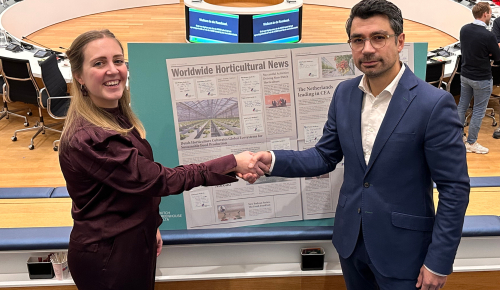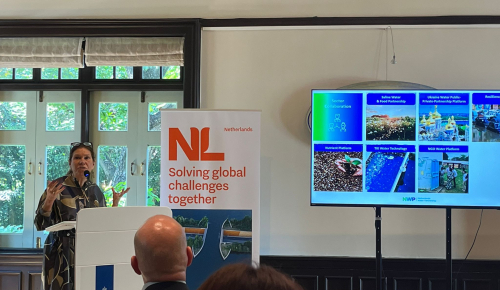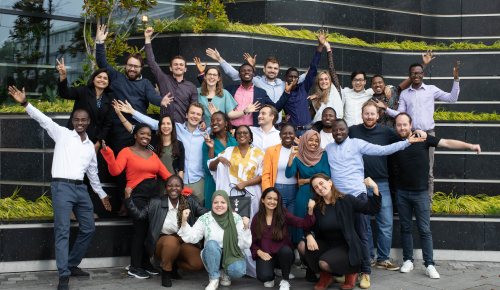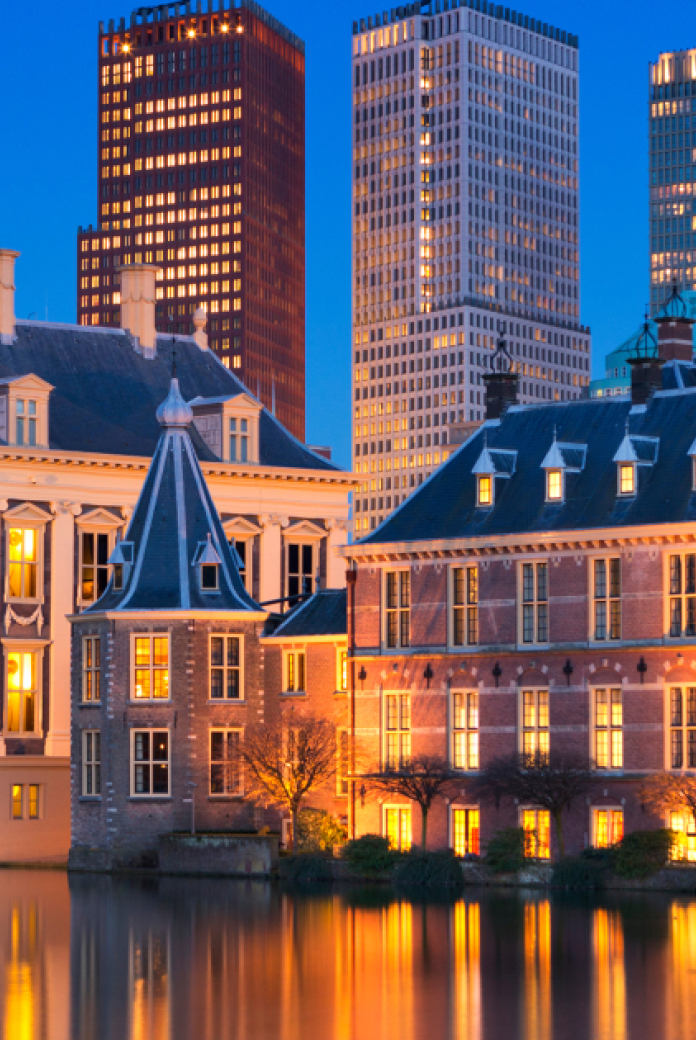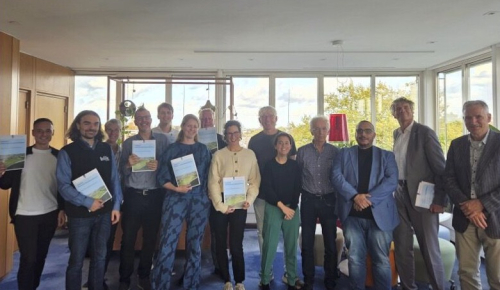Corporate news
10 March 2025Interview with NWP's Director and Chair Rick Elmendorp in H2O Magazine
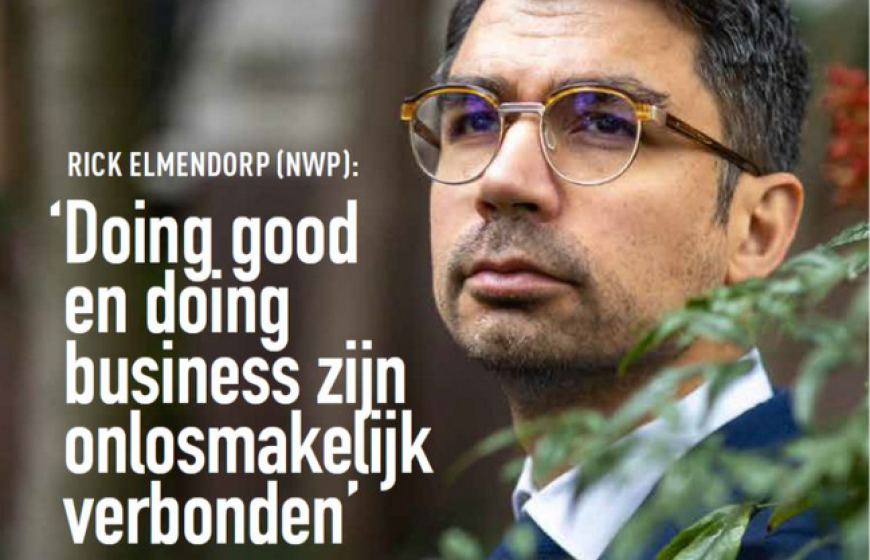

NWP's Director and Chair Rick Elmendorp is featured in a highlighted interview in the latest edition of H2O Magazine. In this interview, he shares insights on how NWP connects Dutch water expertise to global water challenges, and he explains how NWP works to build bridges between the water sector and other sectors, such as agriculture, horticulture, finance, and more. The interview was originally in Dutch and has been translated into English.
The Netherlands Water Partnership links the Dutch water sector to international water issues, and vice versa. NWP's Director and Chair Rick Elmendorp wants our country to be able to continue playing a key role in the world. Will this succeed with a primarily inward-looking Cabinet? ‘Keep the machine running, is our message.’
Water worldwide is a pool of misery, but also of opportunities, former Water Envoy Henk Ovink once said. Rick Elmendorp emphasises the former in particular. “Too much, too little or too polluted water: countless problems in the world can be traced back to it. The climate is changing, the world’s population is growing, the demand for freshwater is increasing and biodiversity and water safety are under pressure. So Dutch knowledge and skills in water management, infrastructure and technology are badly needed in many countries. To name a few examples of success, Dutch companies are working on greening the desert in Egypt, groundwater monitoring in Ethiopia, and UV water treatment in several European countries. Sharing our expertise offers huge opportunities for knowledge exchange, innovation, economic growth and competitiveness.”
‘Water connector’
The Netherlands Water Partnership has some 200 members that are made up of engineering firms, drinking water companies, water technology companies, contractors, consultants, knowledge institutions, NGOs and governments. “We are the ‘oil person’ – we prefer to say ‘water connector’ – between these groups and international organisations that face water issues. In practice, we receive specific water requests from countries, the Dutch Government asks us to take up a water issue somewhere, or a Dutch water company wants to expand its commercial operations abroad. NWP brings people together, guides the start of projects, and promotes cooperation. After all, this does not happen by itself.”
NWP was founded in 1999 because of the need for a stronger, united voice from the Dutch water sector to capitalise on international opportunities. Six years later, after Hurricane Katrina in New Orleans in the USA, NWP proved its worth when Dutch companies started playing a crucial role in the design and building of the new levee system in the city. NWP's work has changed over the years, Elmendorp says. “In the early days, the goal was to unite public and private organisations in the Dutch water sector. The focus then shifted abroad, and now we also cooperate with other sectors, such as agriculture and finance.”
''NWP brings people together, guides the start of projects, and promotes cooperation. After all, this does not happen by itself.''
Rick Elmendorp
NWP's Director and Chair
Exports by companies in the Dutch water sector increased substantially last year, according to research you commissioned.
“This trend has been visible for some time. In 2022, the export value was almost EUR 10 billion, up from EUR 8.1 billion a year earlier. Over the past 20 years, exports increased by a whopping 248 percent. This is not surprising as international demand for Dutch water knowledge and solutions is rising, global water challenges are increasing, the global economy is growing, and our country is, after all, an authority in this field. The water sector contributes only 1.5 to 2 percent to the gross national product in the Netherlands directly, but indirectly it contributes much more. Without good water management, there would be no health, food, industry, or safety. And abroad, water opens doors. You come here to get expertise: diplomatically a fine starting point for other economic activities.”
NWP enables Dutch companies to solve global water issues in a fair and environmentally friendly way and to make money. Do they always go together?
“We believe that doing good and doing business are inextricably linked. Of course, the definitions of ‘fair’ and ‘environmentally friendly’ are not the same everywhere in the world, and of course, not all countries look at climate issues and the United Nations' Sustainable Development Goals in the same way. This sometimes creates tension, but I am convinced that sustainable business, with a social impact as well as a return on investment, is the only way forward these days. Especially if you want to tackle global water challenges.”
The current Water Envoy, Meike van Ginneken, said in H2O that ‘Our country should not only send water knowledge but also receive it’.
“It does indeed go both ways. The Netherlands has a lot to offer, but can certainly also learn a lot from other countries. One example is dealing with prolonged periods of drought, with which we do not yet have much experience. Surface water quality is also an issue for us. Let's work on an equal relationship with other countries. Equality is a prerequisite for a pleasant business atmosphere anyway. Project examples always used to be taken from abroad. We now have examples here, such as the Sand Motor for innovative coastal maintenance in South Holland. I can imagine this happening more often here in the future as some new solutions can also be very useful for our own country.”
'We can try to share our water ingenuity, but ultimately the countries in question have to want it. Sometimes they simply act irresponsibly,' former NWP chairman Sybe Schaap said in H2O.
“We have to keep spreading the message that technical or technological solutions are not always the holy grail. Firstly, because they cost a lot of money, and secondly, because they are not always logical or desirable. For example, is it wise to grow water-intensive crops on water-poor soil? Is it wise to build a dam if it causes water shortages in lower-lying areas? Whether countries are receptive to this is a second thing. Then it is key not to give up, but to keep talking.”
The new Government has turned its gaze inwards, wanting to cut back sharply on development aid and focusing mainly on trade with developing countries. Does this complicate your work?
“Water and food security are spearheads in the coalition agreement, which is positive. It is also beneficial for businesses in the water sector that the focus is on trade and earning power. However, for our member NGOs, the announced cuts are worrying. How it will work out on balance, we do not yet know, but constructive talks are ongoing.
Last December, in an initial discussion with Minister Klever for Foreign Trade and Development , we asked that the Dutch water sector’s strengths remain intact. We were then at the table with the entire sector. Our story is that we are a well-oiled machine, with cooperation in and between all layers in the water sector, where everyone has their roles and contributions. If you weaken one of the NGOs, knowledge institutions, or civil society, you weaken the whole system and thus the successful Dutch approach and our country's global impact. Furthermore, we told her that water should be integrated into other policy areas. Policies are often shaped in silos. But if you see water as an integral part of climate, agriculture, the economy and migration, you can make more effective policies with less money. Both at home and abroad.”
‘Water sector and Minister Klever find common ground on the issue of migration’ the Water Forum headlined after the talk.
“That is too short of the mark. The connection between water, crises, and forced migration has been made for decades. Fleeing is always the last option; people prefer to stay where they live. Every year, floods, droughts, forest fires and extreme temperatures cause damage worth about EUR 117 billion in agriculture. This is about five percent of global agricultural production. The fact is, is that our water sector can be of great significance for water security and resilient food systems in climate-sensitive regions – and thus for political and economic stability. And this in turn strengthens trade relations with these regions.”
You also argue with Klever for more and different sources of funding.
“Access to funding is often a barrier for international water projects. There is a big gap between funding for start-ups and pilot projects and funding on the scale of Invest International – a joint venture between the Dutch Government and the FMO development bank – and development banks. That makes it difficult to grow further. Who should cross the divide? I see a role for the Government. NWP, for example, has started an initiative where we use government funding to build a business case and bridge the risk, and then help attract private funding.”
''NWP has started an initiative where we use government funding to build a business case, bridge the risk, and then help attract private funding.''
Rick Elmendorp
NWP's Director and Chair
But the Government has to make cuts.
“Yes, and that means making choices. Which water themes should our country focus on and in which countries? That is why it is so important to draw on all the networks that companies, NGOs and knowledge institutions have built up in recent years. These existing networks are stronger in some countries than in others. In countries where there is a strong Dutch embassy, for example, the opportunities for our water companies are many times greater. In the end, it's all about adding up the factors for where you can achieve the most. We also need to monitor the results of projects properly and critically. In terms of Government funding a lot is measured, but it is not always about the right goals. Is a solution or product still usable 10 years from now? Does it meet local or regional needs? These are relevant questions.”
You mentioned at the beginning of the conversation that NWP is increasingly looking beyond the traditional boundaries of the water sector.
“Water touches on everything. The overarching question is how the sectors involved can reinforce each other and create one agenda to achieve shared goals. For instance, we will set up a platform for climate-resilient cities and coasts, which will include landscape architects and urban planners. In the agricultural sector, we are working closely on smart solutions for sustainable food systems and food security. We do so with various partners including the Netherlands Food Partnership – which matches public and private entities in the Dutch food sector to low- and middle-income countries – and Dutch Greenhouse Delta, the platform for internationalising the Dutch horticultural sector. And in terms of Saline Water & Food Systems, we are working with all kinds of organisations to tackle salinisation. Finally, it would be good if we could form a coalition with financial institutions. Bring development banks and private investors such as NGOs, venture capitalists, impact investors and commercial banks together to connect, talk, and then puzzle out the financing of international water projects.’
What drives you in your work?
“I have a financial background. I first worked for several years in banking and insurance. But I needed more meaning, and I was not getting it in that world. I then switched to an NGO and five years ago I joined NWP. My goal is to leave the world better than how I found it. NWP is the place to do that. When business, government, NGOs and knowledge institutions join forces, you can achieve so much. This work suits my personality. I am optimistic, love cooperation and always look for shared interests and win-win situations. And if you can also create social impact, it doesn't get any better.”
I am optimistic, love cooperation and always look for shared interests and win-win situations. And if you can also create social impact, it doesn't get any better.”
Rick Elmendorp
NWP's Director and Chair
